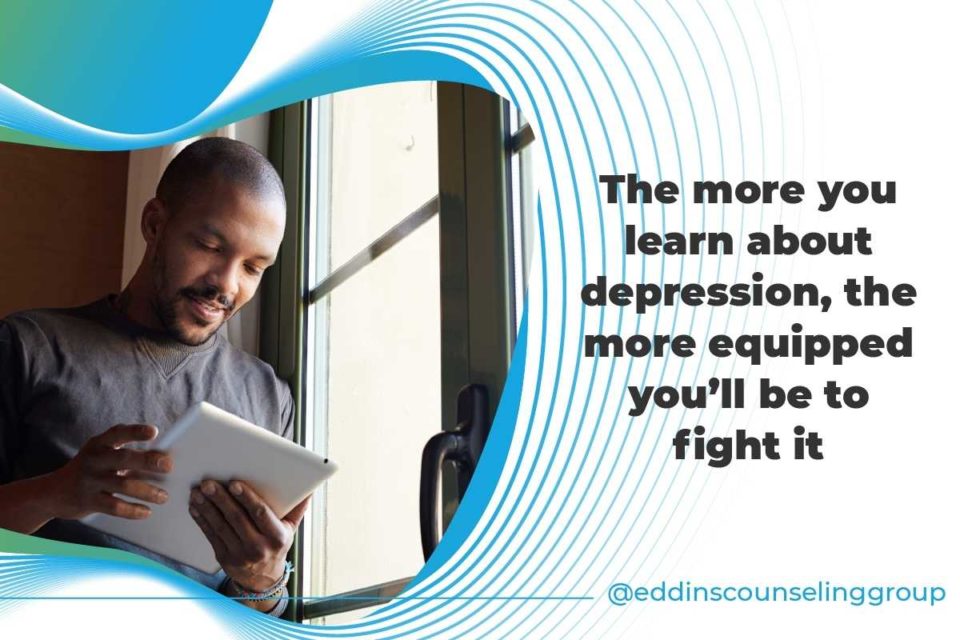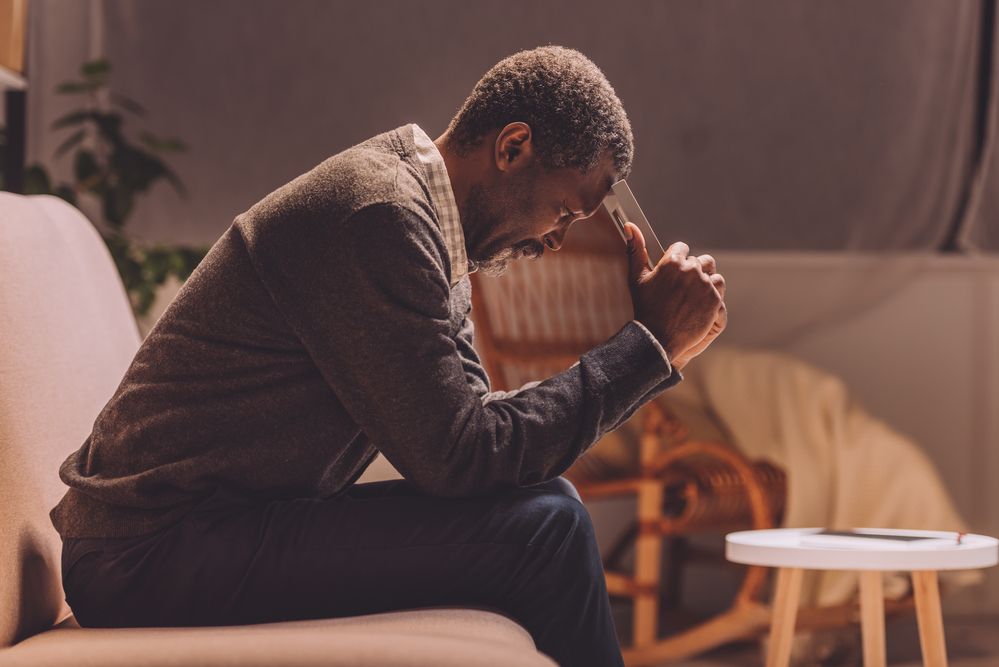October 27, 2020
Deal with Depression: 9+ Strategies to Help You Cope
Written by Sara Lane
Posted in Depression, Emotional & Mental Health and with tags: coping skills, depression, therapy
Depression is one of the most common mental ailments in the world.
In the United States alone, millions deal with depression. Without learning how to fight depression, people can feel isolated and alone, even hopeless.
It robs them of all the joy, color, and happiness their lives once had.
Those with depression experience feelings of extreme sadness or despair last for at least two weeks or longer. These feelings interfere with activities of daily living, such as working, sleeping, and even eating.
People who are depressed may become overwhelmed and exhausted and stop participating in certain activities altogether. They may withdraw from family and friends.
Some may have thoughts of death or suicide. If any of the above resonates with you, read this and get some facts on depression.
If you are depressed and have ever heard the words “Get over it,” you know how frustrating it is when others underestimate your struggle.
Getting over it isn’t as simple as it sounds, especially when you’re facing depression. The journey to recovery can seem like a mountain looming in front of you.
Despite the enormity of the obstacle, the most critical part is to begin the journey and remember what lies on the other side.
What can you do to deal with depression?
Short answer: do something. If you are beyond sadness and think you may have depression, consider these ways of coping with it.
Also, consider getting competent care in the form of professional help.
If depression is not dealt with decisively, it can last for a long time and make other illnesses worse.
Depression counseling is an integral part of a successful treatment approach.
If you are reading this because someone you love is battling depression, encourage them to complete the depression test below, take steps to alleviate the feelings they struggle with, and, ultimately, seek out a therapist.

How to Fight Depression: 17 Ways
If your life is going to improve, it’s up to you. Nobody asked for depression, but if it’s found you, it’s up to you to seek a way to manage it so you can find some peace and pleasure in life.
You may need to be more self-reliant than others when finding comfort in a stressful world. In the end, if you do nothing, nothing will change.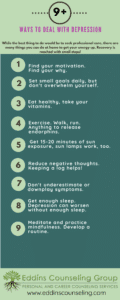

It takes courage to make a positive change in your life. It may be difficult, but not impossible. While the best thing to do would be to seek professional care, there are many things you can do at home to get your energy up. Recovery is reached with small steps!
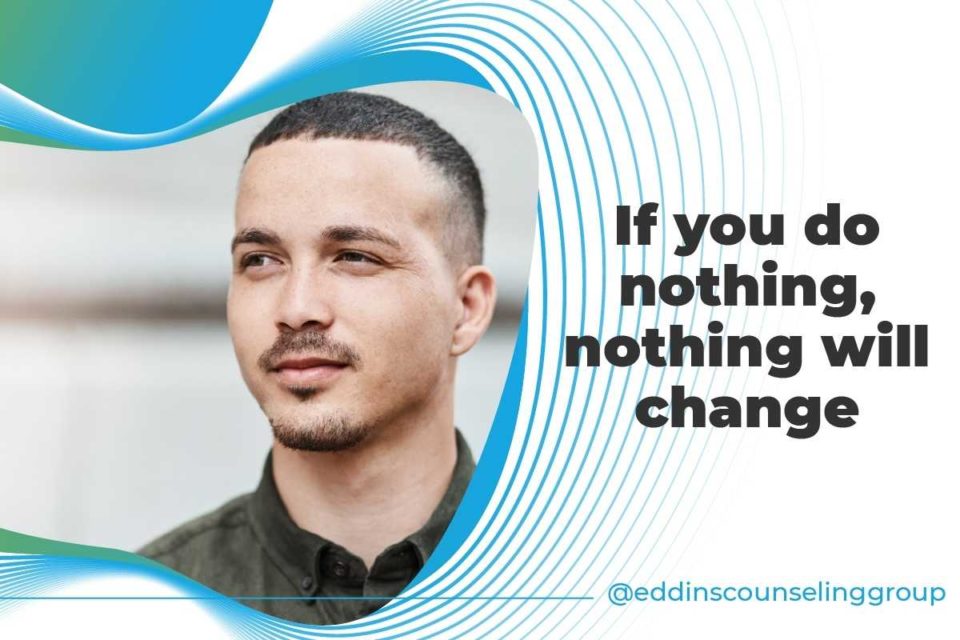
1. Find your motivation
Nothing will happen unless you’re mentally ready. That’s why you first have to find what motivates you.
Is it getting back to doing something you used to love? Or perhaps spending more time with the people you care about most.
2. Set small goals daily
Goals help keep you grounded. Make them something you can handle. It doesn’t have to be anything huge.
Try to complete specific tasks around your home or stay involved with responsibilities at work. Take one step at a time and pace yourself.
Give yourself positive feedback when you accomplish them!
If your goal is to go for a short walk, or make a phone call, reward yourself by taking the time to enjoy something you like. Take things slowly and meditatively.
3. Eat healthily and take your vitamins
Scientists found that your brain is only as healthy as your digestive system.
Therefore, it’s a good idea to keep your gut in good shape and limit your intake of sugar and processed foods because they can cause inflammation that affects your health negatively.
On the other hand, food with omega-3 fatty acids and folic acid may help ease depression.
Also, vitamin D and B-complex vitamin supplements can help alleviate depressive symptoms and help you keep optimal mental health.
However, always make sure you check with your doctor before using supplements, especially if you’re taking antidepressant medication.
4. Exercise
Do something to get your heart pumping for a few minutes.
Try dancing in your living room or jumping jacks. Getting your blood pumping helps you feel better and diminish pain.
If more vigorous exercise isn’t your thing, take yourself for a walk around the block. You might try yoga or stretching exercises in your living room.
Aerobic workouts encourage the release of endorphins to block stress hormones while stimulating serotonin production to lift the mood.
Regular exercise can stimulate the brain to rewire itself positively. In particular, swimming can have a powerful effect on reducing panic and sadness due to its repetitive mechanics.

5. Get sunlight exposure
Soaking up some sunshine for 15-20 minutes a day helps regulate the circadian rhythm, which manages brain wave activity and hormone production.
If the climate doesn’t allow it or simply can’t find the time, the easiest thing to do is use a sun lamp instead.
6. Reduce negative thoughts
“Thinking positive” is a good mantra but hard to follow. Try this tip to challenge your negative thinking: log it.
Yes, try keeping a log of your negative thoughts. Review them later and ask yourself if they are justified.
Look at other ways to view the situation. Recognize that negative thinking is more of a thought pattern or habit than a reflection of the real problem!
You’ll probably begin to see that many of your negative thoughts are wild over-generalizations or evidence of all-or-nothing thinking that is both negative and unrealistic.
Learn more about negative self-talk and depression here.
7. Don’t Underestimate or Downplay the Symptoms
It’s scary to think you may have a diagnosable mental health disorder. But it’s nothing to be ashamed of. Again, depression is incredibly common and very treatable.
The sooner you get help, the better. Be vigilant about identifying signs and symptoms.
8. Sleep enough
Depression can worsen if you don’t get enough sleep, but sleeping well may also be a struggle for you. To overcome difficulty sleeping, keep a strict schedule.
Go to bed and get up at the same time each morning, don’t nap during the day, and banish screens (computer, TV, phone) from your bedroom.

9. Meditate
Fighting depression means a lot of mental work. You have to change how you think.
Not only does that mean you have to learn to challenge negative thoughts with logic, but you should also get into a routine of daily mindfulness practice with meditation.
10. Record joys and accomplishments
Just as you should record negative thoughts, document those little pleasures that help carry you through moments of anxiety and sadness. Stop and reflect. It’s beneficial to keep a written record.
When memory gets blurred due to mental stress, you can look at your list and recall those things that brought you happiness and satisfaction.
Here are some questions to prompt you.
11. Laugh
Have some fun! Learn how to laugh. It speeds up the healing process.
Researchers found that laughter increases beta-endorphins and human growth hormone production, decreasing depressive symptoms.
12. Do something new
Find something new, like a hobby, food, to try out. It changes the level of dopamine, the chemical that causes pleasure and enjoyment.
Start with little things and work up to something bigger and bolder.
- Before bed, drink a warm cup of chamomile tea. It may help you to relax or sleep better if you are having sleeping problems.
- Try making a new recipe or try out a craft you’ve always liked.
- Have you ever tried aromatherapy? A variety of oil extracts or infusions help alleviate stress and depression. Oils of jasmine, lemon, and sandalwood are known to offer benefits. Other helpful scents are orange trees and oranges.
Don’t be afraid to give new things a chance.

13. Confide in a Loved One
Depression will urge you to withdraw and isolate.
Do not suffer alone. Pick at least one trusted ally to talk to. Let them know you’re struggling. Ask them to check in with you.
Even if it has to be an online connection right now, you need to have an outlet for your suffering and a compassionate voice of reason.
It can be quite soothing to find someone who can support you and encourage you to commit to counseling.
Like weather on a mountainside, life can change quickly and unexpectedly. So your mood might take a surprising downturn.
Make sure you have a support system in place. Find people you can lean on when the ever-changing winds of your emotional state blow too hard.
14. Stop and Reflect, Keep a Journal
Allow yourself time to meditate on your journey. Mentally or in writing, note the things you’ve discovered on this climb.
Note how your emotions change. Consider what problems you might have encountered and what efforts you’ve made to continue.
Enjoy the journey. Let yourself laugh and be in the moment.
One way to help differentiate between sadness and depression is to monitor moods, symptoms, and triggers carefully. A journal is ideal for this purpose. It will also come in very handy when you see a therapist.
Review our journaling exercises here.
15. Schedule a Physical Examination
It may feel less daunting to see your primary care physician for a check-up first. This can help rule out physical causes for what you’re feeling.
Your doctor may also be ideally positioned to help you move forward with setting up the next steps of your effort to get help and recover.
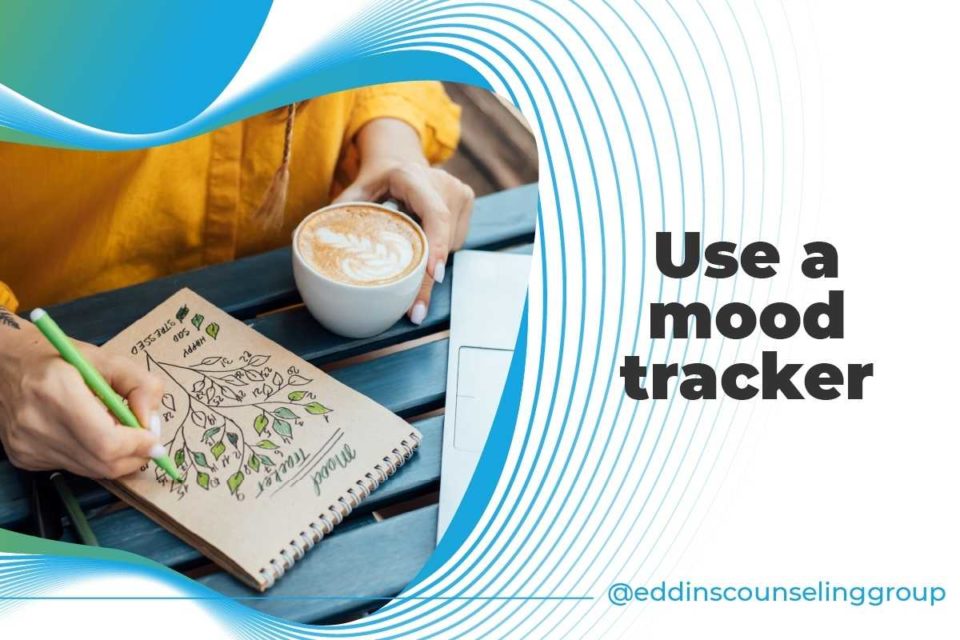
16. Use a Mood Tracker to Track Your Mood
Tracking your mood over time can be a very helpful way to monitor your mental health, especially if you are struggling with depression.
It’s important to identify patterns in your moods and to know when to reach out for more help when you notice depression symptoms increasing.
People often don’t realize the severity of symptoms of depression until it becomes difficult to manage. In the U.S., 25% of the population suffers from a mood disorder and can often make people feel that they are isolated and alone.
Benefits of Tracking Your Mood:
- Identify patterns and recognize depression triggers
- Stay mindful of your mental health and emotional state
- Catch symptoms of depression before they become severe
- Recognize warning signs of a new depressive episode
- Monitor strategies that help you stay out of depression
- Coordinate with your therapist for more effective treatment planning for your depression
- Track effectiveness of depression coping strategies
- Plan better for your mental health
- Feel in charge of your depression and take proactive steps towards your mental health
There are several mood tracker apps available as well as worksheets. Or you can simply make a note in your daily calendar.
Paying attention to the patterns and fluctuations can provide you (and your therapist) with important insight into managing your depression and recognizing triggers.
17. Create a Daily Routine
Even if you don’t feel motivated, it is helpful to create a daily routine. Try doing the things you liked to do when you were feeling better.
It might be hard to motivate yourself to get “back into the groove” of something you once enjoyed, but if you view it as therapy, you might gain a new appreciation for it.
Though, if you think you can’t stick to these steps by yourself, consider recruiting an experienced guide – find yourself a good therapist.
Signs That Professional Therapy for Depression Is Needed
- Thinking about death or suicide. This is always dangerous, and you should see a professional therapist immediately.
- When symptoms of depression continue for a long time, you may need professional help. Acute responses to events (such as trauma, job loss) are normal, but they should not last beyond a reasonable time.
- Your depression impairs your ability to function. Seek help before your life situation deteriorates severely.
- You have become so isolated that you have no one with whom to test reality. Seek someone out to share your thoughts and feelings with.
- Depressive symptoms have become severe.
Learn more about the causes of depression here.
Read about the types of depression here.
Get Help Overcoming Depression
Depression can rob you of joy, but you don’t have to face it alone. Houston therapists can help overcome depression. Contact us at 832-559-2622 or schedule an appointment online for depression treatment.
Read more about our depression treatment services.
Can Depression Be Treated Successfully?
Absolutely.
Depression is highly treatable when you receive appropriate care. There is still some stigma associated with seeking help for emotional and mental problems.
Unfortunately, feelings of depression are often viewed as a sign of weakness rather than a signal that something is out of balance.
The fact is that people dealing with depression cannot simply “snap out of it” and feel better spontaneously.
Those with depression who don’t seek help suffer needlessly. Unexpressed feelings and concerns accompanied by a sense of isolation can worsen depression. The importance of obtaining quality counseling for depression can not be overemphasized.
Understanding the three basic ways to treat depression: psychotherapy, self-help, and medication.
There is no “best depression therapy.” Everyone is different. Everyone’s depression is different. That being said, many people respond best to a combination of two or more methods.
- Psychotherapy: Exploring one’s beliefs and ways of thinking, and learning new ways of thinking and behaving, with the guidance of a Houston professional.
- Self-help: Exploring one’s beliefs and ways of thinking on one’s own.
- Medication: Altering one’s brain chemistry by taking antidepressant medication.
A physician may recommend medication when four conditions exist:
- The client’s depression is severe.
- The client has suffered at least two previous depressive episodes.
- There is a family history of depression.
- The client asks for medication only and refuses psychotherapy.
Medications can help reduce the symptoms of depression in some people, particularly for moderate to severe depression cases.
Some health care providers treating depression may favor using a combination of psychotherapy and medications. Given the side effects, any medication use requires close monitoring by the physician who prescribes the drugs.
Some individuals may prefer depression therapy to use medications, especially if their depression is not severe.
Finding a therapist can make recommendations about an effective treatment course for an individual’s depression by conducting a thorough assessment.
How does therapy help depression?
A qualified counselor is positioned to assist you in restoring the pleasure of living. With different types of therapy they can guide you through this challenging time by helping you:
1. See your true personality – separate you from your depression symptoms
When depression is severe, it becomes part of your identity. Everything you think about and do centers around your ailment.
Cognitive-behavioral therapy can help you understand depression and sift through these distortions to see how depression has affected your behavior. This will help you rediscover your true self – the person you once were.
2. Overcome fears and insecurities
Depression therapy will help you identify negative thought patterns that contribute to you feeling hopeless and helpless.
Participating in therapy for depression will help you address your uncertainties and low self-esteem.
They will help you to regain confidence and stop isolating yourself.
3. Improve your relationships with family and friends
A counselor can teach you coping skills that will help reduce tension with others. They will also show you how to nurture, strengthen, and enjoy relationships that are important to you.
Secure attachments, in turn, lead to better moods and family life.
4. Reduce mental chaos – be more in control and organized
Studies have shown that depression can cause structural changes to your brain’s memory and decision-making areas.
Depression counseling can help sharpen your thinking and strengthen your focus and memory. Feeling more capable makes handling anything easier.
5. Improve physical health
Depression takes a toll on your body, not just your mind. It messes with your sleep and wake cycles. Consequently, it may cause you to become less active or turn to comfort foods.
Furthermore, low levels of certain brain chemicals can even trigger cravings for carbs. Treatment can address all these problems and help you feel more energized.
6. Stop destructive habits
A strong connection also exists between depression and high-risk behaviors.
Some have turned to alcohol, drugs, unsafe sex, and other non-suicidal self-injurious behavior to suppress emotional pain. A depression counselor can assist you, step by step, to free yourself from these destructive habits.
7. Establish dependable routines
A counselor can help you see what changes you need to make. They may also teach you techniques and strategies to follow through.
Together, you will set goals and draft a plan to bring joy back into your world.
Establishing good and stable routines will help you to move forward and reach those goals.
Patterns will also keep you from easily falling back into your old habits. They are the backbone of dealing with depression.
8. Identify factors contributing to depression
Psychotherapy offers the opportunity to deal effectively with the psychological, behavioral, interpersonal, and situational causes.
Skilled therapists can work with depressed individuals to pinpoint the life problems that contribute to their depression and help them understand which aspects of those problems they may solve or improve.
9. Identify options and set realistic goals
A trained therapist can help depressed clients enhance their mental and emotional well-being. Therapists also help them identify how they have successfully dealt with similar feelings if they have been depressed in the past.
Having one episode of depression increases the risk of having another. There is some evidence that ongoing counseling for depression may lessen the chance of future episodes or reduce their intensity.
Through therapy, people can learn skills to avoid unnecessary suffering from later bouts of depression.
Helping Loved Ones
Living with a depressed person can be very difficult and stressful for family members and friends. The pain of watching a loved one suffer from depression can bring about feelings of helplessness and loss.
Seeking family or marital therapy for depression may bring together all the individuals affected and help them learn effective coping mechanisms.
This type of psychotherapy can also provide a good opportunity for individuals who have never experienced depression themselves to learn more about it and identify constructive ways of supporting a loved one suffering from depression.
Why do people get depressed? Read about the causes of depression here.
Treatment without Medicine
One of the leading methods for dealing with depression is cognitive therapy. Cognitive therapists help depressed clients feel better by identifying how negative ways of thinking make them feel bad.
The client analyzes their thoughts and beliefs and learns to substitute more healthy ways of thinking and believing (positive self-talk).
Many mental health professionals believe that the ideal treatment of clinical depression is medication in conjunction with psychotherapy.
Recovery Is Within Your Grasp
It’s okay to feel sad, but it’s critical to examine both sadness and depression. Their differences and similarities impart vital information for a path toward relief and long-term mental health.
When you are clear on what you’re dealing with, it is then time to focus on getting the help you need.
Both sadness and depression are tough and should be honored for what they are. A significant part of this process is seeking out appropriate support.
Consulting a health professional can help you clarify what’s going on and perhaps discern a source or cause. You don’t have to suffer alone or in silence. There is no shame in naming your emotional pain.
Quality treatment is available. Healing can happen.
Understand Symptoms with Depression Counseling
If you’ve been keeping a journal, bring it with you. What matters most is that your therapist learns as much about you as possible.
For example, it helps to know if there are any underlying medical causes for your condition. From there, you will work together as a team using one of several proven therapeutic approaches for depression.
You’ll learn the skills you need to understand what you’re dealing with and why. Thanks to counseling, you can feel better and be better positioned to prevent depression from returning.
The more you learn about it, the more equipped you’ll be to fight it.
Read more about the signs and symptoms, risk factors, as well as treatment and therapies for depression on the National Institute of Mental Health website.
Then take the first step toward help and health. Struggling with your depression symptoms is nothing to be ashamed of.
It can be hard to deal with depression and to own up to feelings of unhappiness, but living alone with depression doesn’t help you or the people you love.
Next Steps
To learn more about depression therapy and its benefits, read our depression treatment page or contact a therapist at Eddins Counseling Group.
To get counseling for depression, give us a call to schedule an appointment at 832-559-2622 or schedule an appointment online.
7 Mood-Boosting Tips
Get instant access to your free ebook.
Grounding & Self Soothing
Get instant access to your free ebook.
Why You Feel This Way
Get instant access to your free ebook.
Create Healthier Thoughts & Feelings
Get instant access to your free ebook.


